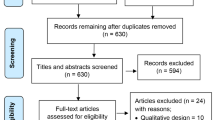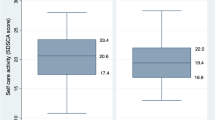Abstract
Background
Resource-poor primary health settings in an urban slum presented with special challenges in diabetes care. The study evaluated a need-based, patient-friendly, acceptable, appropriate package of care and its implementation in primary healthcare setup.
Material and Methods
An open-label two-arm parallel randomized controlled trial with 40 patients in the control group who received medical management as prescribed by physician and patients in the intervention group receiving usual medical care + group-based comprehensive diabetes management program. HbA1c, weight, BMI, Quality of Life Instrument for Indian Diabetes Patients (QOLID) scores, and audit of Self Care Inventory-Revised Version (SCI-R) were assessed at baseline and 6 months.
Result
There was a significant reduction in mean HbA1c levels in the intervention arm (8.44, SD = 1.802 to 7.56, SD = 1.87) as compared with the control arm (8.4, SD = 1.87 to 8.19, SD = 1.77). Multiple linear regression model (R2 = 0.886, ANOVA F (7, 72) = 79.733, p < 0.001) found a fall in blood sugar levels (β = − 0.511, p < 0.001), improvement in QOLID scores (β = 0.221, p = 0.004), increase in physical activity (β = 0.198, p = 0.006), and fall in BMI (β = 0.153, p = 0.009) to be predictive of change in HbA1c.
Discussion
The patient profile consisted predominantly of homemakers, with low formal education and belonging to lower socio-economic strata. They depended primarily on the public health system for their health care needs and could benefit most from the implementation of the program. There was an improvement in knowledge, regular follow-up, compliance to medication, diet, and physical activity along with improvement in glycemic control, self-care behavior and quality of life of patients in the intervention arm.
Similar content being viewed by others
References
Aguiree F, Brown A, Cho NH, Dahlquist G, Dodd S, Dunning T, et al. IDF diabetes atlas: International Diabetes Federation; 2013.
Sathish T, Williams ED, Pasricha N, Absetz P, Lorgelly P, Wolfe R, et al. Cluster randomised controlled trial of a peer-led lifestyle intervention program: study protocol for the Kerala diabetes prevention program. BMC Public Health. 2013;13(1):1035.
Venkataraman K, Kannan AT, Mohan V. Challenges in diabetes management with particular reference to India. Int J Diabetes Dev Ctries. 2009;29(3):103–9.
Anand K, Shah B, Yadav K, Singh R, Mathur P, Paul E, et al. Are the urban poor vulnerable to non-communicable diseases? A survey of risk factors for non-communicable diseases in urban slums of Faridabad. Natl Med J India. 2007;20:115–20.
Nagpal J, Bhartia A. Quality of diabetes care in the middle- and high-income group populace: the Delhi diabetes community (DEDICOM) survey. Diabetes Care. 2006;29:2341–8.
Ramachandran A, Mary S, Sathish CK, Selvam S, Seeli AC, Muruganandam M, et al. Population based study of quality of diabetes care in southern India. JAPI. 2008;56:513–6.
Shobhana R, Begum R, Snehalatha C, Vijay V, Ramachandran A. Patients’ adherence to diabetes treatment. J Assoc Physicians India. 1999;47:1173–5.
Weinger K, Beverly EA, Lee Y, Sitnokov L, Ganda OP, Caballero AE. The effect of a structured behavioral intervention on poorly controlled diabetes: a randomized controlled trial. Arch Intern Med. 2011;171(22):1990–9.
Agurs-Collins TD, Kumanyika SK, Ten Have TR, Adams-Campbell LL. A randomized controlled trial of weight reduction and exercise for diabetes management in older African-American subjects. Diabetes Care. 1997;20(10):1503–11.
Gucciardi E, DeMelo M, Offenheim A, Stewart DE. Factors contributing to attrition behavior in diabetes self-management programs: a mixed method approach. BMC Health Serv Res. 2008;8(1):33.
Balagopal P, Kamalamma N, Patel TG, Misra R. A community-based diabetes prevention and management education program in a rural village in India. Diabetes Care. 2008;31(6):1097–104.
Nagpal J, Kumar A, Kakar S, Bhartia A. The development of quality of life instrument for Indian diabetes patients (QOLID): a validation and reliability study in middle and higher income groups. J Assoc Physicians India. 2010;58:295–304.
Weinger K, Butler HA, Welch GW, La Greca AM. Measuring diabetes self-care a psychometric analysis of the self-care inventory-revised with adults. Diabetes Care. 2005;28(6):1346–52.
Peyrot M, Rubin RR. Behavioral and psychosocial interventions in diabetes a conceptual review. Diabetes Care. 2007;30(10):2433–40.
Kernan WN, Viscoli CM, Makuch RW, Brass LM, Horwitz RI. Stratified randomization for clinical trials. J Clin Epidemiol. 1999;52(1):19–26.
Snehalatha C, Viswanathan V, Ramachandran A. Cutoff values for normal anthropometric variables in Asian Indian adults. Diabetes Care. 2003;26(5):1380–4.
Mohan V, Shah S, Saboo B. Current glycemic status and diabetes related complications among type 2 diabetes patients in India: data from the A1chieve study. J Assoc Physicians India. 2013;61(1 Suppl):12–5.
Acknowledgments
Late Dr. Ratnendra Shinde, Former Professor & Head, Community Medicine and the Department of Community Medicine Seth GS Medical College and KEM Hospital, Mumbai.
Author information
Authors and Affiliations
Corresponding author
Ethics declarations
The study was approved by Institutional ethics committee of Seth GS Medical College & KEM Hospital.
Conflict of interest
The authors declare that they have no conflict of interest.
Additional information
Publisher’s note
Springer Nature remains neutral with regard to jurisdictional claims in published maps and institutional affiliations.
Rights and permissions
About this article
Cite this article
Baviskar, M.P., Rangari, S., Mishra, S. et al. Assessment of a group-based comprehensive diabetes management program to improve glycemic control, quality of life and self-care behavior in patients with type 2 diabetes mellitus in a primary healthcare setting of a metropolitan city in India: CDMP MUM Trial. Int J Diabetes Dev Ctries 41, 156–163 (2021). https://doi.org/10.1007/s13410-020-00828-1
Received:
Revised:
Accepted:
Published:
Issue Date:
DOI: https://doi.org/10.1007/s13410-020-00828-1




